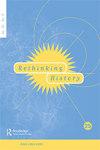人类世的浪费与历史性
IF 0.8
2区 历史学
Q1 HISTORY
引用次数: 0
摘要
摘要:本文认为人类世的历史存在是由浪费构成的。随着行为和产品的浪费越来越多地支配着自然、社会和政治环境。人类世作为自然史上的一个开端,与伴随其兴起而来的大量垃圾是分不开的。我们贪得无厌的浪费和我们对地球的垃圾改造反过来又给历史意识和历史理论带来了明显的后果。历史思维和历史写作必须考虑到物质和超历史层面的浪费。这一挑战的关键是乔治·巴塔耶(Georges Bataille)的思想,他试图通过以浪费代替生产来重新定位政治经济学。由于消费是人类生存的中心,21世纪的历史学家可以对历史知识进行类似的重组。浪费构成了主权的核心体验。在浪费中,消费者获得了对自我、世界和历史的短暂主权。本文还考察了让·鲍德里亚对历史终结的表述,即拒绝的时刻,以概述浪费是如何作为一种历史条件出现的。作为这种联系的结果,它还考虑了废物的历史性如何重塑历史学家在评估人类世时的自我理解。(7724字)本文章由计算机程序翻译,如有差异,请以英文原文为准。
Waste and historicity in the Anthropocene
ABSTRACT This article argues that historical existence in the Anthropocene is constituted by waste. As both act and product waste increasingly dominate natural, social, and political environments. The Anthropocene as a threshold in natural history then is inseparable from the profusion of waste that has accompanied its rise. Our insatiable wastefulness and our reforming of the planet with trash in turn create distinct consequences for historical consciousness and historical theory. Historical thinking and historical writing must reckon with waste in its physical and metahistorical registers. Key to this challenge is the thought of Georges Bataille, who attempted to reorient political economy by centering waste in place of production. With expenditure at the center of human existence, twenty-first-century historians can undertake an analogous restructuring of historical knowledge. Waste constitutes a central experience of sovereignty. In wasting, the consumer attains momentary sovereignty over self, world, and history. This article also examines Jean Baudrillard’s articulation of the end of history as a moment of refusal in order to sketch how waste has emerged as a historical condition. As a consequence of this connection, it also considers how the historicity of waste might reshape the self-understanding of historians as they take stock of the Anthropocene. (7724 words)
求助全文
通过发布文献求助,成功后即可免费获取论文全文。
去求助
来源期刊

Rethinking History
Multiple-
CiteScore
1.20
自引率
0.00%
发文量
26
期刊介绍:
This acclaimed journal allows historians in a broad range of specialities to experiment with new ways of presenting and interpreting history. Rethinking History challenges the accepted ways of doing history and rethinks the traditional paradigms, providing a unique forum in which practitioners and theorists can debate and expand the boundaries of the discipline.
 求助内容:
求助内容: 应助结果提醒方式:
应助结果提醒方式:


